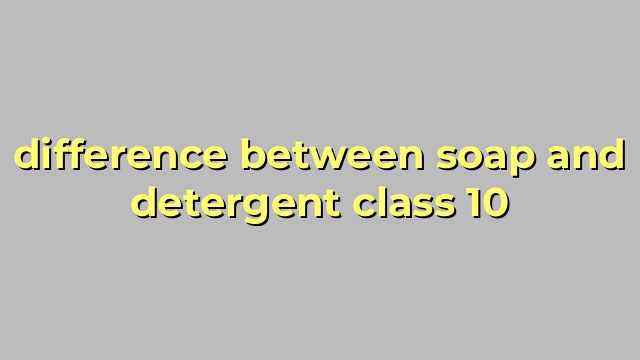Difference between Soap and Detergent Explained
Cleaning products are an essential part of our daily lives. Soaps and detergents are the two most commonly used cleaning agents. However, people often use these terms interchangeably, without realizing that there are significant differences between them. Here’s a detailed explanation of the differences between soap and detergent.
What is Soap?
Soap is a cleaning agent that has been around for thousands of years. It is made by combining fats or oils with an alkali such as lye (sodium hydroxide). This process is called saponification. Soaps are generally made from natural ingredients like palm oil, coconut oil, or vegetable oil.
Soap works by breaking down oils and dirt particles on the surface of the skin, clothes, or surfaces to be cleaned. The dirt particles attach themselves to the soap molecules and get washed away with water.
What is Detergent?
Detergents are synthetic cleaning agents made from petrochemicals. These are often used in cleaning products that need to be effective in hard water. Unlike soap, detergents do not react with hard water minerals, making them more efficient in cleaning.
Detergents are made from a combination of surfactants, builders, and enzymes. Surfactants are the active ingredients in detergents that break down dirt and grease by lowering the surface tension of water. Builders, on the other hand, soften the water and help prevent mineral buildup. Enzymes break down organic stains that are difficult to remove.
Key Differences between Soap and Detergent
There are several differences between soap and detergent.
Chemical Composition: Soap is made from natural ingredients like oils or fats, while detergents are synthetic, made from petrochemicals.
Lather: Soap produces lather easily, while detergents don’t. However, detergents can be formulated to lather well.
Hard Water: Soap is ineffective in hard water due to the minerals that react with the soap. In contrast, detergents work well in hard water.
Effectiveness: Detergents are generally more effective in removing tough stains like grease and oil, while soap is suitable for regular cleaning tasks.
Environmental Impact: Soaps are biodegradable, while most detergents are not. Detergents can also contain harmful chemicals that can harm the environment.
In conclusion, both soaps and detergents have their unique advantages and disadvantages. While soaps are more natural and biodegradable, detergents are more effective in removing tough stains and work well in hard water. Ultimately, the choice between soap and detergent depends on personal preference and the cleaning task at hand.
Table difference between soap and detergent class 10
Here is a sample HTML table that highlights the difference between soap and detergent:
| Property | Soap | Detergent |
|---|---|---|
| Source | Natural, made from fats and oils | Synthetic, made from petroleum products |
| Effectiveness | Less effective in hard water, forms scum | More effective in hard water, no scum formation |
| Biodegradability | More biodegradable and environmentally friendly | Less biodegradable and environmentally harmful |
| Pricing | Expensive | Cheaper |
| Usage | Milder and less harsh on skin | Harsher and can cause skin irritations |

